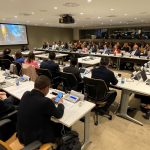
SDGs and the impact of Megatrends on families:
Perspectives from Asia
Side-Event during the 57th session of the UN Commission on Population and Development
Co-organized by the International Federation for Family Development and the Doha International Family Institute
Co-sponsored by the Permanent Mission of Malaysia to the United Nations
Wednesday, May 1, 2024 – 1.15 – 2.30 PM
UN Headquarters NYC – Conference Room 9
Some of the participants in the event, which included representatives from Belarus, Cambodia, Gambia, Indonesia, Iran, Kazhastan, Malaysia, Mexico, Philippines, Qatar, Singapore, Turkey, UN-DESA, UN-Habitat, UNFPA, UNICEF and several Asian and European NGOs.
BACKGROUND NOTE
This year marks the 30th Anniversary of the International Year of the Family and of the International Conference on Population and Development. Both anniversaries encourage us to review processes, to take stock of progress, to reflect on the current status and to better prepare the future of the socio-economic support to the family for better population outcomes as contained in Chapter V of the ICPD.
The 2030 Agenda for Sustainable Development allows us to have a common ground and constructive framework to improve support for families while facing challenges related to several megatrends such as demographic shifts, migration, urbanization, and climate change. Within a family and its needs, all these megatrends intertwine highlighting the need for further research in understanding challenging connections.
For instance, demographic shifts are affected by migration and urbanization policies, which can either support family well-being or expose them to exclusion and risk. In this regard, climate change, with its increasing frequency and severity of extreme weather events, is forcing people to migrate from their homes in search of safety and opportunity. In turn, this migration fuels urbanization as people move to cities, straining infrastructure and resources. In turn, urbanization worsens climate change impacts, such as pollution and loss of biodiversity, making cities more vulnerable.
Sustainable urbanization is crucial for managing various challenges faced by families while adaptation technologies can help mitigate climate change’s effects on families. Especially, when there are a lot of initiatives on family-friendly urban planning, emphasizing intergenerational perspectives to create secure environments for all members of the family aiming to foster interaction and community cohesion within cities.
Among the efforts to advance research and policy recommendations from every region the International Federation for Family Development and the Doha International Family Institute, along with other transnational partners and in partnership with the United Nations Department of Economic and Social Affairs have been preparing for the 30th Anniversary of the International Year of the Family for 2024, by organizing regional expert group meetings (EGM) to further understand how four megatrends affect families.
On this occasion, we turned to Asia as one of the world’s most populated regions with more concentration of families. The conclusions and policy recommendations of the Asian Regional Expert Group Meeting, hosted by the National Population and Family Development Board Malaysia (LPPKN) in February 2024, will convey policy recommendations agreed among experts invited from all the region during the upcoming session of the Commission on Population and Development in New York in April-May 2024.
AGENDA
Opening Remarks
Renata Kaczmarska
Focal Point on Family, Div. for Inclusive Social Development
Department of Economic and Social Affairs, United Nations
“30th Anniversary of the International Year of Family”
Hairil Fadzly Md Akir
Deputy Director General. National Population and Family Development Board. Malaysia.
“SDGs and Families: Perspectives from Malaysia”
Presentation
Interactive Discussion
Ignacio Socias
Director of International Relations
International Federation for Family Development (IFFD)
“Civil Society Perspectives on Megatrends”
Text
Chemba Raghavan
Senior Advisor, Early Childhood Development
UNICEF
“Climate Change and Early Childhood Development”
Presentation
Benjamin Perks
Division of Global Communications and Advocacy
UNICEF
“Parenting Support”
Presentation
Fatima Al Motawaa
Research and Grants Specialist
Doha International Family Institute (DIFI)
“Evidence-based perspectives from Middle East”
Presentation
MODERATION & WRAP-UP
José Alejandro Vázquez
Representative to the United Nations
International Federation for Family Development (IFFD)
Q & A
Gallery
Intervention at High Level Panel
IFFD Oral Statement to the Commission



























